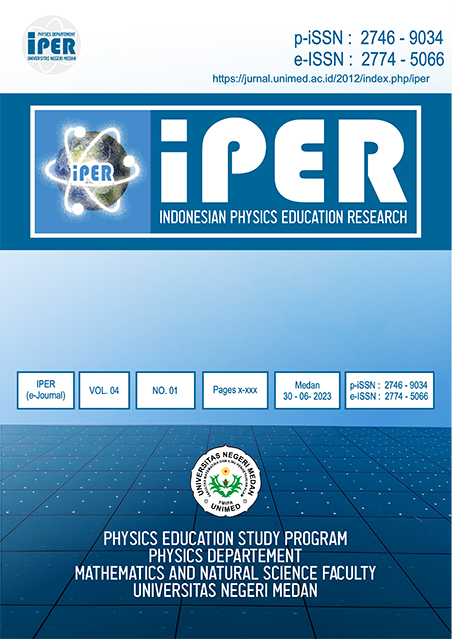THE EFFECTIVENESS OF LEARNING USING E-MODULES BASED ON PROBLEM BASED LEARNING TOWARDS PHYSISCS STUDENT LEARNING OUTCOMES
DOI:
https://doi.org/10.24114/iper.v4i1.63097Keywords:
E-module, Problem Based Learning, , OutcomesAbstract
This research aims to design e-module based on problem based learning in work and energy materials. This research method uses Research and Development (R&D) with ADDIE model that are Analysis, Design, Development, Implementation, Evaluation. The research population was students in SMA Negeri 1 Tanah Pinem Class X Science. The data instruments used in this research consisted of validation questionnaires for material expert, media expert, teacher, and student responses questionnaires. The effectiveness quality of the e-module is seen from the pretest and posttest results with N-gain of 0.78 in the high category which shows that the class had increase learning outcomes in the high category. Based on the data, it can be concluded that the e-modules based on problem based learning on work and energy materials are valid and effective.References
A. Astalini, Dwi A. Kurniawan, Nugroho Kurniawan & Lika Anggraini. (2019). Evaluation of Student™s Atitude Toward Science in Indonesia. Journal for Educational Research, 2019, 3(1), 1-12.
Hake, Richard R. (1998). œInteractive-Engagement versus Traditional Methods: A Six-Thousand-Student Survey of Mechanics Test Data for Introductory Physics Courses. American Journal of Physics 66 (1): 64“74.
Made Wisnu Adi Pramana, I Nyoman Jampel, dan Ketut Pudjawan,(2020) Meningkatkan Hasil Belajar Biologi Melalui E-Modul Berbasis Problem Based Learning, Jurnal EDUTECH Universitas Pendidikan Ganesha, 8(2), 17-32
Megawanti, P. Meretas Permasalahan Pendidikan di Indonesia. Jurnal Formatif. 2(3): 227-234
Saniman, Nurdin Bukit dan Mariati P.S. (2015). Efek Model Problem Based Learning Dan Pemahaman Konsep Fisika Terhadap Hasil Belajar Siswa. Jurnal Tabularasa PPS Unimed, 12 (2), 130-139
Sudjana. (2007). Metode Statistika. Bandung: PT. Tarsito Bandung.
Sugiyono. (2011). Motede Penelitian Kuantitatif, Kualitatif, dan R&D. Bandung: Alfabeta.
Siswanto, Maridi, dan Marjono. (2012). Pengaruh Model Problem Based Learning (Pbl) Terhadap Kemampuan Memecahkan Masalah Dan Hasil Belajar Kognitif Biologi Siswa Kelas Vii Smp Negeri 14 Surakarta Tahun Pelajaran 2011/2012, Jurnal Pendidikan Biologi, 4(2), 53-59
Tambunan,E dan Bukit, N. (2015). Analisis Pengaruh Model Pembelajaran Kooperatif Tipe Group Investigation dan Pemahaman Konsep Awal Terhadap Hasil Belajar Siswa di SMA Negeri 1 Teluk Mengkadu. Jurnal Pendidikan Fisika. 4(1), 49-56
Torp, Linda, and Sara Sage. (2002). Problems as Possibilities: Problem-Based Learning for K-16 Education (2nd Ed.). Alexandria, VA: Association for Supervision and Curriculum Development.
Qomariyah, S. N. (2019). Effect of Problem Based Learning Learning Model to Improve Student Learning Outcomes. International Journal of Educational Research Review, (2009), 217“222.








